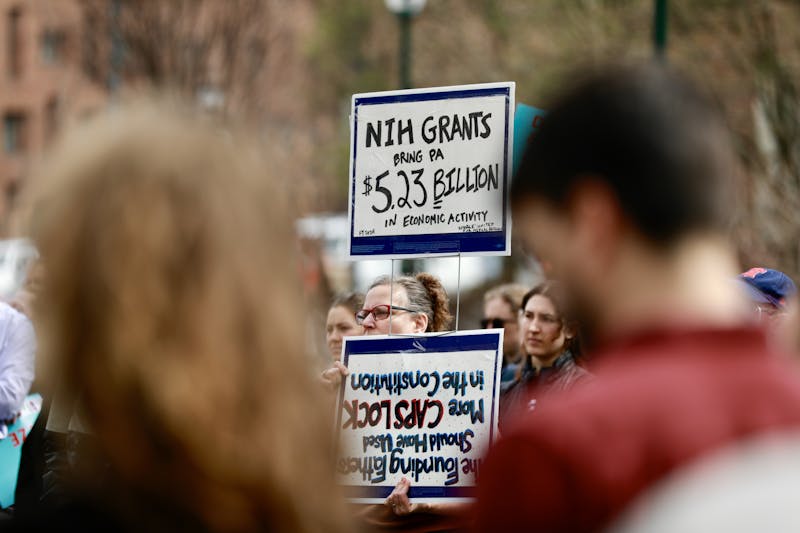Holding the UA to account
To the Editor:
As chairman of the Undergraduate Assembly's ad-hoc committee on pluralism, I was disappointed by recent DP criticism ("Superficiality over need," The Daily Pennsylvanian, 2/28/02). I would like to clarify some of the misconceptions that were stated about our purpose and our mission.
In addition to bridging the gaps within the University community, the purpose of the committee is to raise the profile of minority issues within the UA and ensure that they are dealt with in an appropriate manner. This committee allows UA members, who are interested in issues of pluralism, integration and race relations, to work exclusively on these issues.
In addition, the committee holds someone on the UA accountable for these issues. Traditionally, the UA has been an extremely homogenous body that did not enthusiastically take up issues relating to pluralism. By creating this structured committee, the UA ensures that these issues are not ignored or thrown by the wayside in future.
Although the goals of this committee may be more abstract and we can understand the skepticism surrounding it, it is both premature and irresponsible to state that it "is a waste of time and energy."
We should be given sufficient time to work on these issues before judgment is passed. Pluralism is an important concept, and it should not be ignored or belittled simply because it may be abstract.
This committee was created because there is a genuine desire within the UA to be more responsive to the issues affecting specific groups on campus. By establishing this new committee, the UA puts in place an established mechanism to hold it accountable in the future.
Gautam Mashettiwar
Engineering '03
The writer is a member of the Undergraduate Assembly and chairman of the pluralism committee. 'Democracy denied'
To the Editor:
The graduate student union movement rallied last week to the cry, "Democracy Delayed is Democracy Denied" ("Grad students hold pro-union rally," DP, 2/19/02).
One should question the degree to which the proposed union election would be truly democratic. Not only are certain schools and certain departments exempted from the proposed union shop, but only current teaching and research assistants in union-targeted departments would have the right to vote on the issue.
This means that the proposed union vote asks the some 600 graduate students who happen to serve as teaching assistants and research advisors this year to choose or reject a union for the equally numerous group of graduate students who are currently matriculated in the same group of union-targeted departments, but are not currently serving as TAs or RAs.
Moreover, because the union shop would only represent graduate students while they serve as TAs and RAs, many of the students who would vote on unionization this year would not be eligible for union membership next year or in subsequent years.
In my book, a poll on unionization that permits only a portion of the proposed membership to vote on the issue is not really very democratic.
Every current graduate student who would be affected by the union should have the right to vote on the union. While it is true that federal law to a large extent defines the possibilities in this matter -- and perhaps these laws should be challenged, given the particular circumstances. While there is precedent for this sort of union vote, I think the union activists should reconsider precisely the manner in which we could find "democracy denied."
John Nemec Religious Studies Ph.D. student History and historiography
To the Editor:
Aliya Sternstein's recent column ("A Textbook for Future Generations", DP, 2/25/02) is a disturbing example of an increasingly popular belief about the purpose of studying history. Sternstein's examples in particular, the internment of Japanese Americans and the persecution of Jews by the Nazis, imply that one undertakes to study the past not to determine how and why events transpired, but rather to determine exactly who we should be blaming for past crimes, and by extension, who should feel ashamed of their heritage.
The discipline of history, however, is neither a collective flogging process nor a contest to determine who is the most reprehensible perpetrator and who is the most innocent victim. Sternstein implies that historical details must be brought to light so as to ensure generations of future American schoolchildren aren't deluded into thinking that "[Daniel] Pearl represents the American work ethic. He sacrificed his life for the job. Daniel Pearl was a martyr."
The creation of heroes and martyrs, and for that matter villains and tyrants, is not so much the focus of history, but a byproduct of historiography. Historians should endeavor to eliminate bias from their work insofar as they are able, but they examine the past to understand and to progress, not to condemn.
Sternstein is right: every effort should be made to examine all facets of any historical event -- that is how we come to understand the human experience, to ameliorate mistakes and to avoid making them in the future.
As George Santayana noted, "those who cannot remember the past are condemned to repeat it." We do not need to make the focus of future history classes lectures on blame and guilt.
Jennifer McNamara
College '02
The Daily Pennsylvanian is an independent, student-run newspaper. Please consider making a donation to support the coverage that shapes the University. Your generosity ensures a future of strong journalism at Penn.
DonatePlease note All comments are eligible for publication in The Daily Pennsylvanian.







